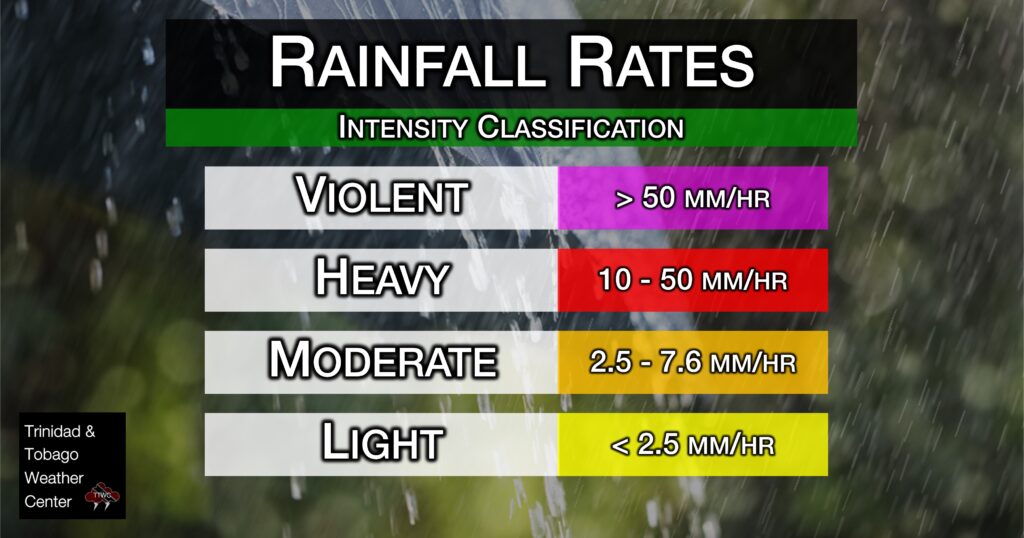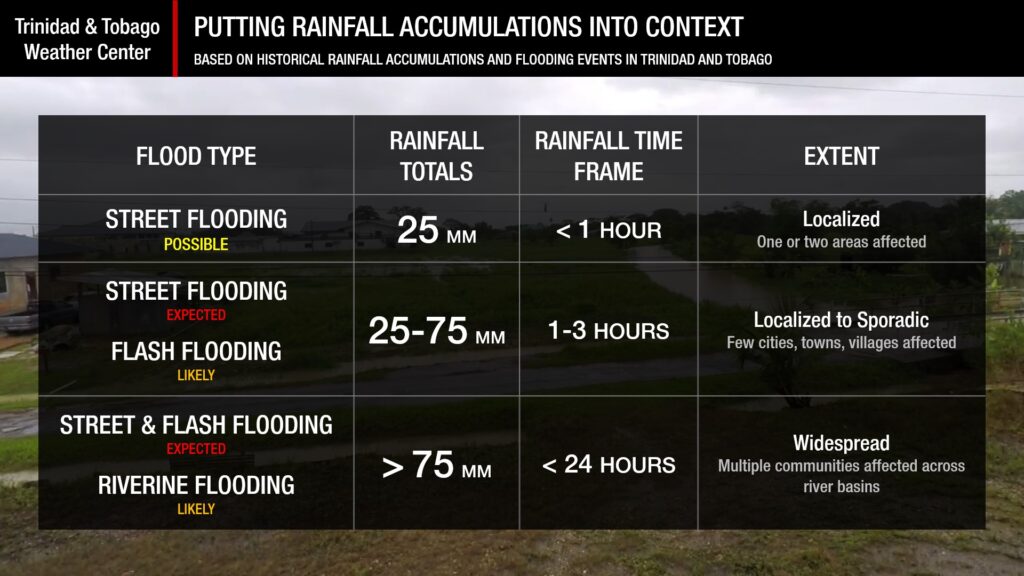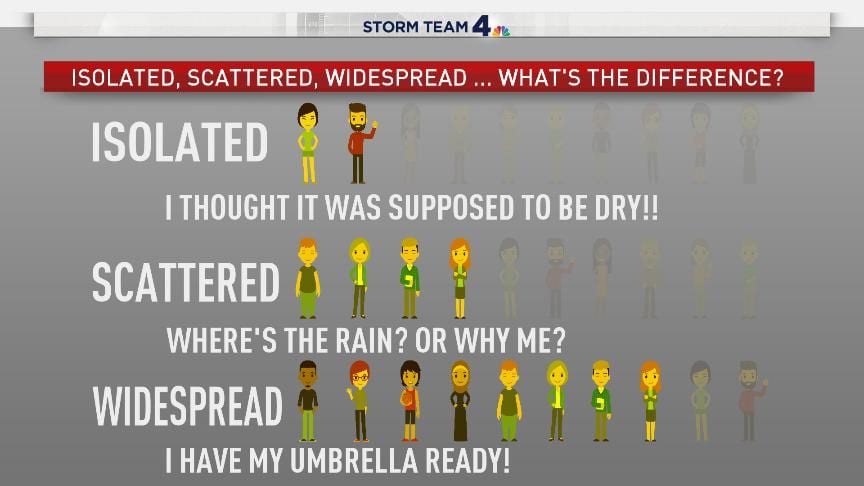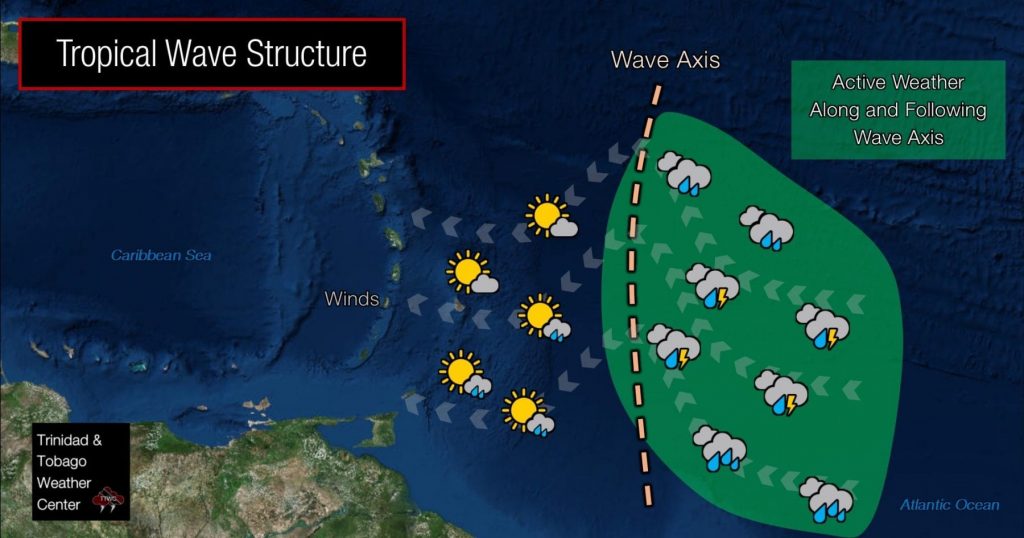The Intertropical Convergence Zone continues to produce rainfall across Trinidad and Tobago as two tropical waves – Tropical Wave 08 and Tropical Wave 09 – are set to move across the Lesser Antilles on Sunday night and Monday night, respectively.
What you need to know
— Rainfall: Over the next five days, through Friday night, overall rainfall accumulations are forecast to range between 25 and 50 millimeters across both islands. Across Eastern Tobago, the eastern and southern halves of Trinidad, and localized western coastal areas, totals between 50 and 100 millimeters of rainfall are forecast.
— Saharan Dust: Mild dust levels are forecast through Monday, with moderate to high concentrations from Tuesday through the remainder of the week.
— Hazards: The main hazards over the next five days, primarily through Tuesday, will be gusty winds exceeding 50 km/h as well as the threat of street or flash flooding, both of which are likely to occur mainly in association with heavy showers and thunderstorms. Increased low-level winds, combined with gusts in heavy showers and thunderstorms, may cause weaker and/or larger trees to fall. Riverine flooding is not expected
— Marine: Moderate seas are forecast in Trinidad and Tobago’s open waters, while choppy conditions are forecast in sheltered areas. Seas across northern areas may become rough from Sunday night through Tuesday. All marine interests are advised to exercise caution in the vicinity of heavy showers and thunderstorms.
Latest Alerts
Adverse Weather Alert Discontinued. Showers, Thunderstorms Still In The Forecast
Trinidad and Tobago is NOT under any tropical storm or hurricane threat, watch, or warning at this time.
The Forecast
Sunday Night
Sunday NightMonday
MondayTuesday
TuesdayWednesday
WednesdayThursday
ThursdayFriday
FridayMarine Forecast
Slight To Moderate Seas Forecast Into Next Week
Temperatures
Monday
Low: 23-25°C
High: 28-30°C
Feels Like: 30-35°C
Tuesday
Low: 23-25°C
High: 30-32°C
Feels Like: 35-42°C
Wednesday
Low: 24-26°C
High: 31-33°C
Feels Like: 35-42°C
Thursday
Low: 24-26°C
High: 32-34°C
Feels Like: 35-48°C
Friday
Low: 24-26°C
High: 32-34°C
Feels Like: 35-48°C
Forecast Impacts
Flooding
Over the next five days, through Friday night, overall rainfall accumulations are forecast to range between 25 and 50 millimeters across both islands. Across Eastern Tobago, the eastern and southern halves of Trinidad, and localized western coastal areas, totals between 50 and 100 millimeters of rainfall are forecast.
Street & Flash Flooding
Street & Flash FloodingRiverine Flooding
Riverine FloodingForecast Rainfall Totals
- Sunday: Between 10 and 25 millimeters of rainfall is expected across the country, with localized totals of up to 50 millimeters, favoring Tobago, the northeastern and western coastal areas of Trinidad.
- Monday: Between 10 and 25 millimeters of rainfall across both islands, with totals between 25 and 50 millimeters across the eastern half of Trinidad and localized areas of Tobago. Isolated totals, particularly across eastern areas, may exceed 50 millimeters.
- Tuesday: Across the eastern and southern halves of Trinidad, between 5 and 15 millimeters of rainfall, with localized higher totals. Elsewhere, up to 10 millimeters.
- Wednesday: Less than 5 millimeters across the country, with isolated higher totals favoring eastern Trinidad.
- Thursday: Less than 5 millimeters across the country, with isolated higher totals favoring eastern Trinidad.
- Friday: Less than 10 millimeters across the country, with isolated higher totals in heavy showers and isolated thunderstorms up to 30 millimeters, favoring but not limited to southern and western Trinidad.

Understanding Rainfall Accumulations
Putting the rainfall forecast into context, rainfall rates in excess of 50 millimeters per hour or areas that receive in excess of 25 millimeters within an hour tend to trigger street flooding across the country or flash flooding in northern Trinidad. For riverine flooding to occur, a large area of the country (not just in highly localized areas of western coastal Trinidad) would have to record upwards of 75 millimeters within 24 hours, and rainfall would have to fall across major rivers’ catchment areas.

Strong Thunderstorms
Strong ThunderstormsWhat is a strong or severe thunderstorm?
Given how rare these types of thunderstorms are in our region – we classify a severe or strong thunderstorm as one that produces any of the following:
- Damaging wind gusts exceeding 63 KM/H;
- Frequent lightning (more than 30 cloud-to-ground strikes within a 10-minute period);
- Hail (of any size);
- Rainfall of more than 50 millimeters or more within an hour or exceeding 75 millimeters or more within three hours;
- The sighting of a funnel cloud or touchdown of a waterspout/tornado associated with the thunderstorm.
Gusty Winds
Gusty WindsWith wind gusts exceeding 50 KM/H, whole trees can be in motion, with larger trees and weaker branches falling. Light outdoor objects can topple or become airborne, such as garbage cans, loose galvanize, construction material, and outdoor furniture. Tents may also jump.
Other Hazards
Mild dust levels are forecast through Monday, with moderate to high concentrations from Tuesday through the remainder of the week. Hot temperatures are also set to return from Wednesday, with heat indices reaching levels that warrant caution.
Saharan Dust Forecast
Mild Saharan Dust Forecast Across T&T Until Early Next Week
Why I May Not/Will Not See Rainfall?
A frequent complaint is that the forecast is wrong because I didn’t experience any rainfall. Scattered showers mean that you, individually, may experience some showers intermittently throughout the day, and there is a higher chance for this activity than for isolated activity. Widespread showers mean that nearly all people and areas can expect rainfall.
Through Tuesday morning, scattered rainfall is forecast with isolated rainfall through the end of the week.

Forecast Discussion

Tropical Waves (As of 7:00 PM June 22nd)
— Tropical Wave 08: Located along 59W from 14N, moving west around 15-20 knots (28-37 km/h) with scattered showers. This wave is approximately 160 km east of T&T on Sunday night, forecast to move across the country overnight into tomorrow morning, interacting with the ITCZ.
— Tropical Wave 09: Located along 48W from 14N southward, moving west at around 15-20 knots (28 to 37 km/h), forecast to move across T&T on Monday night through Tuesday morning. This wave is embedded within the ITCZ, with widely scattered showers ongoing. A significant surge of Saharan Dust is expected to follow on Tuesday afternoon.
The Intertropical Convergence Zone (ITCZ), dragged northward by Tropical Wave 08, is located across Trinidad and Tobago, as indicated by prevailing wind directions throughout the country: N to NE across Tobago and SE to ESE across Trinidad. This feature has produced rain, showers, and isolated thunderstorms over the past 12 hours across the country, resulting in street flooding primarily in northern Trinidad. Wind gusts have reached between 40 km/h and 50 km/h, resulting in sporadic reports of downed trees and utility poles. A funnel cloud was also reported in the Gulf of Paria on Sunday afternoon.
On Sunday night through Monday morning, an anomalously moist airmass associated with Tropical Wave 08 will move across T&T with favorable low-level convergence and marginally favorable upper-level conditions. Forecast model soundings indicate a near-saturated atmosphere during the early morning hours on Monday, which is expected to lead to efficient rainfall production. This may result in persistent heavy rainfall as diurnal activity ramps up with the ITCZ after midnight. There are some limiting factors, namely moderate to strong wind shear (25-35 knots from the west), as well as an intrusion of Saharan Dust, which is expected to limit rainfall mainly after daybreak. Global, high-resolution, and multi-model consensus modelling show peak rainfall accumulations remaining below 50 millimeters between Sunday night and Monday night, a marked change from models toward the end of last week. As a result, while the threat of riverine flooding has significantly decreased, there remains the risk of street flooding (where smaller drainage systems become temporarily overwhelmed) and flash flooding (where smaller streams or ravines temporarily overtop, usually lasting a few hours at most). An Adverse Weather Alert is in effect from the TTMS.
Tropical Wave 09 then moves in Monday night through Tuesday morning, again interacting with the ITCZ. Again, while an anomalously moist airmass moves across T&T, even more Saharan Dust is forecast to be present, leading to a drier mid-level environment, and wind shear is forecast to be stronger (30-40 knots from the west). As a result, rainfall totals are forecast to be markedly reduced compared to Monday. Isolated thunderstorms, particularly as the ITCZ is pushed southwards, may lead to localized higher rainfall totals across southern parts of Trinidad on Tuesday. Then, a significant surge of Saharan Dust moves in by mid-Tuesday.
Winds, which have been a concern with both of these waves due to mid- and low-level wind increases, have also shown some positive trends in the latest forecast models. High-resolution modelling keeps peak winds offshore, in line with global modelling. For T&T, peak wind gusts are possible between 45 km/h and 55 km/h, with most likely peak gusts around 50 km/h. Stronger wind gusts are forecast across Grenada to St. Vincent and the Grenadines, peaking between 50 km/h and 65 km/h. Ensemble models indicate a 20-30% chance of gusts exceeding 65 km/h for Grenada, primarily on Sunday night through Monday. Latest scatterometer data show winds up to 55 km/h north and east of Tobago associated with TW08’s heaviest showers.
On Wednesday through Friday, a high-pressure ridge regains dominance, overall wind speeds come down, and a moderate to high concentration of Saharan Dust lingers across the area—the result: decreased air quality, hot temperatures, and increased heat indices. By Friday, daytime heating and sea-breeze convergence, particularly as the ITCZ drifts north once more, may add additional moisture to T&T’s environment, leading to some late morning through afternoon pop-up showers and thunderstorms across southern and western areas – a typical occurrence of the Wet Season.












